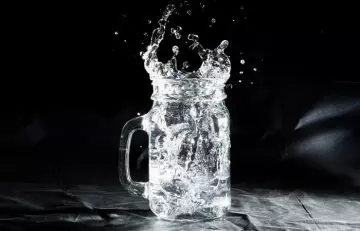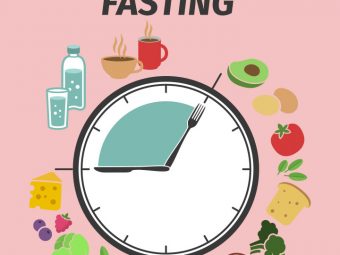What Is Water Fasting And Is It Safe For Weight Loss

Image: Shutterstock
Most of us have come across the notion of fasting—predominantly owing to religious practices (Karwachauth vrath or Sankashti vrath, Ramadan, etc.). But there are various other reasons for fasting, like health problems or simply to get rid of the extra pounds that we carry on ourselves. And, if you are setting off on a fasting spree only to lose some extra weight, then we’re sure you have tried most of the uber cool fad diet options available these days (1). Among the list of diets, water fasting seems to have earned itself the top position. Before we start off to explain what exactly water fasting is, allow us to squeeze in a simple concern that whatever may be the nature of the fast you choose to do, make sure you consult your doctor and keep in mind whether or not your body will be able to handle it.
What Is Water Fasting?
As the name suggests, this type of fasting has everything to do with just water. A person who has decided to fast should stop all sorts of consumption of food and beverages, except for water. Research suggests that although there aren’t any limitations on the number of days for this fast, it is best to limit it from anywhere between 24 hours to 72 hours (2).
Why Choose Water Fast?
Autophagy is the answer to this (3). Water fasting helps in inducing autophagy at a healthy level in our body. Now, if you’re wondering what autophagy is? Well, it’s a process of natural regeneration that occurs in our body at a cellular level (4). It is a mechanism where the body reprograms itself by flushing out the old or damaged cells of our body and replaces them with new ones (we can call it a body reboot). In addition to this, water fasting promotes the growth of good bacteria in our bodies which results in a good digestive system, improved metabolism, weight, and cardiometabolic conditions.
How To Water Fast:
The rules are pretty simple.
- Eat and drink nothing but water for the duration of the fast.
- No vitamins or supplements or any medication should be taken except for thyroid medicine.
- Don’t overexert yourself with activities as it might cause nausea, dizziness or headaches (5).
- Drink a minimum of 2-3 liters of water on each day of the fast. You can definitely drink more.
- This fast is strictly prohibited for people suffering from chronic disorders, eating disorders, type 1 and type 2 diabetes. Children, pregnant woman, and those with kidney problems, etc., should refrain from this diet too, as it could lead to further health complications (6).
Important To Note: Also, if you haven’t ever fasted before, prepare your body by going on a liquid diet before you start this water fasting. Another important thing to remember is that post the water fasting, never gorge on a big meal immediately. Eat in small portions and allow your body to come back to normal. Else, you might develop a Refeeding syndrome—a crucial condition where your body undergoes whirlwind changes in fluids and electrolytes (7).
Benefits Of Water Fasting
1. It Can Reduce Blood Pressure
Research shows that a medically supervised water fasting has led to a considerable reduction in blood pressure in those who suffered from high blood pressure (8).
2. It Can Improve Leptin And Insulin Sensitivity
These two are the hormones that affect our body’s metabolism. Insulin helps to store the nutrients from the blood, whereas, leptin is responsible to help our body feel full (9), (10). And, water fasting can improve their sensitivity.
3. It Can Lower The Risk Of Chronic Diseases
Studies have also shown that observing a water fast for just 24 hours has resulted in lower levels of cholesterol and triglycerides in the blood, which are otherwise the primary reasons for heart diseases (11). A study has shown that water fasting can prevent and control chronic diseases like diabetes and cancer (12), (13).
Negative Impacts Of Water Fasting
This type of fasting can be extremely challenging for certain individuals and dangerous too. The study shows that extreme water fasting can affect the kidneys and lead to a decrease in the CoQ10 level in our body (14). CoQ10 is an enzyme which is naturally produced by our cells and tissues. This enzyme is responsible for pumping energy into our cells and strengthening our muscles (15). Excessive water fasting can lead to brain fog, fatigue, dehydration, and even orthostatic hypotension.
Therefore, it is mandatory to enter the world of water fasting only under medical supervision. Water fasting for one or two days is feasible, but if you are planning to continue it for more than 2 days, consult your doctor. Because any type of fasting when done on an extreme level without proper medical guidance can have negative repercussions on the body.
Have you tried water fasting? Do you think it’s easy and beneficial? Let us know about your experience in the comments below.



























